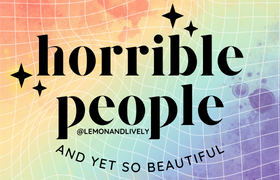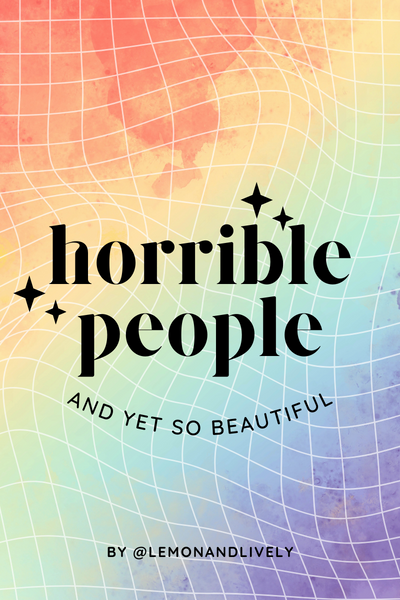Author note: I think I write much better in third person POV. I might go back and change previous chapters at a later date. Having DID myself, writing about characters in first person point-of-view is extremely dissociating. What’s more, articulating the experience of DID through characters is easier via third person POV for my brain.
Olive stopped going out, save for the twice weekly trips to places she didn’t tell Cameron. Faye began offering support groups after school for local high school students to help them cope with the stress that often accompanies the winter holidays. Worrying about other people was normal for Faye; it was not normal for Cameron, who’d begun to feel more caregiver than ghostwriter to Olive Dooley.
This week, Olive’s lounging about in a shirt that hung off her shoulder, black camisole underneath, and grey sweats. She eats her cereal like a toddler lacking the motor development to always get the food in her mouth and doesn’t care when it falls on her clothes.
Olive and Cameron don’t go to Kat’s Bizness anymore. Olive looks like she’s been dumped, but Cameron’s too cautious to ask. She considered calling Bridey, but decided against it—no reason talking to someone you couldn’t stand about something you can’t stand even more. Might Faye count as a therapist, even though she’s family? Could she be a loophole?
Cameron sits on the couch end opposite where Olive is slumped, eating popcorn with chopsticks and watching a medical drama. “I saw this museum in town having a special display.”
Olive looks at Cameron for a moment, then back at the TV.
“If you want to come with me—”
“I don’t,” she replies, sharp and stinging.
“If I’ve done something to offend you—”
“It’s not you, Cam, it’s me. I don’t feel like doing anything. I enjoy my time alone, used to have it, and now I don’t. Surprise, surprise—Olive Dooley is an introvert! And this introvert has been going places with someone constantly.”
Cameron nods. “Okay…” She’s so alone… She knows. Cameron knows she’s pitying a person whose entire life is under a microscope and that she has no right to push her into doing things she feels uncomfortable about, but she also has obligations she can’t fulfill if there’s no Olive. She doesn’t say anything, for she knows all too well that the last thing Olive wants anyone to do is pity her.
Regardless, she scoots closer and removes the bowl of popcorn from Olive’s lap. “You need to at least sit up, though.” Instant regret. Olive’s side-eye is proof enough that this was the absolute worst course of action, and Cameron doesn’t have words to explain herself—doesn’t know how. Why?!
Olive doesn’t hit or yell at Cameron in response. She sits up, takes the popcorn back, and returns to her show. It’s during times like this when Olive reminds Cameron of the woman she longs for the most: Ashley, with dirty blonde hair and blue eyes, who couldn’t stand pink—a complete opposite of Olive Dooley, who was all about pink.
Cameron’s Ashley, though, left her alone in a hotel room the day before Thanksgiving with her family.
✩✩✩✩✩✩✩✩✩✩✩✩✩✩✩✩
“You could’ve helped,” Olive says as she drops the last stack of VHS tapes on the floor in front of the coffee table. In Cameron’s defense, Olive hadn’t asked—nor had she told Cameron what she was doing—in the first place. “The early ones you can watch yourself—mostly commercials. There are behind-the-scenes clips after, because it’s not uncommon for them to keep rolling in case we did something cute. You can’t always capture babies behaving cutely on camera; a lot of it is left to chance. There’s chatter by the adults about us; you might find something useful.”
Oh. This is for the book. Cameron pulled a tape from the box marked Toddlerkins. “Episode one hundred two?”
Olive nods. “Yeah. There were episodes for two and a half years. It was like…I mean, I don’t have an example, but it was ‘very British and very adorable’, according to the media. My mum’s friend wrote it, so I was in it.”
If a random paparazzo heard her say that, they might assume she was happy and pleased, but Cameron knows her better now. The smile Olive donned as she shared how she got into Toddlerkins is fake; Olive’s trained herself so well that Cameron can’t tell whether Olive realizes. It’s subtle, but not for anyone who lives with her long enough. Faye taught her sister too much about psychology for these little oddities in Olive’s behavior to go undetected; she can’t be sly in such company.
“I thought we might start watching things from when I was older, when I could remember things better and fill you in on them.” She holds up Family Holiday, the case of which features a girl no older than five wearing white pantyhose, red shoes, and a red-and-white dress; a bow is in curly, blonde hair, and she’s holding a curly, brown teddy bear; her left hand is held by a man in a suit. She must’ve noticed Cameron’s frown at the standstill between what looked like the parents, because next she says, “It’s about a little named Eloise, caught between the messy divorce of her parents. It was actually inspired by What Maisie Knew, which is equally sad. In the end, the father’s best friend parts ways with him and adopts Eloise. Both parents are terrible, neglectful…” she trails off; her countenance throws Cameron off.
This is new—vulnerable. Cameron contemplates nurturing it so she can reach deep and pluck out all the bits she can for the book. This is what makes good writing. This is the type of nonfiction people ache to read and struggle to put down: the kind that travels into the depths of one’s soul and reveals shocking pieces of who exactly that person is.
In favor of building better trust with Olive, Cameron decides not to. “We don’t have to—”
“It’s fine!” She’s quick, her tone slightly deeper and more neutral in geographic origin. Olive let Cameron in, accepting her place in her life now, but continues to hide her emotions—as if letting Cameron see too much is going to end badly for her. “This is work.” She smiles.
Olive, you don’t fool me anymore.












Comments (0)
See all